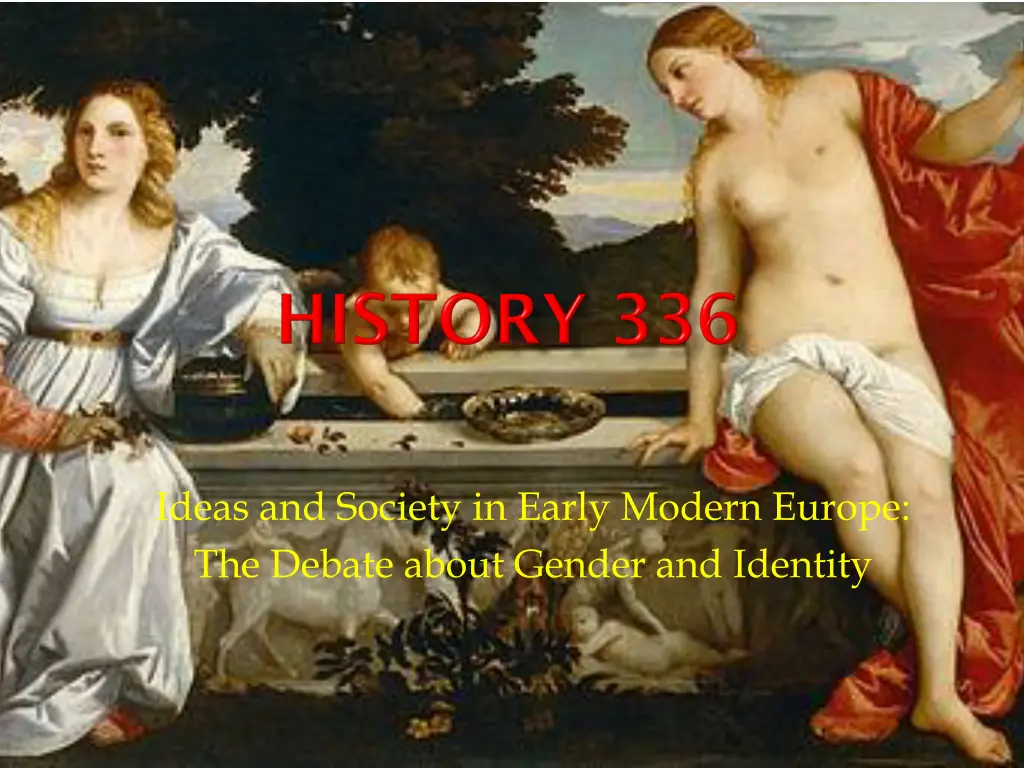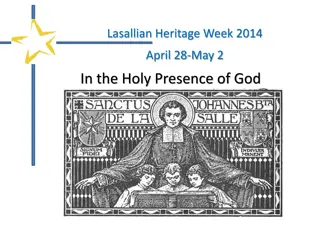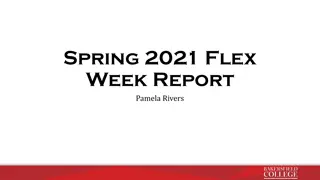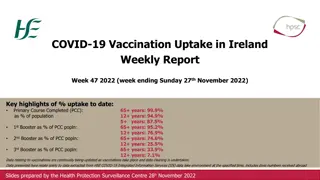
Gender, Power, and Society in Early Modern Europe Debate
Explore the complex relationship between gender, power, and society in Early Modern Europe, focusing on debates about identity, colonization, gendered processes, the querelle des femmes, formal versus informal power structures, effects of Protestantism, women's exclusion from citizenship, political theories, and societal norms. Delve into historical texts and cultural dynamics shaping perceptions of masculinity, femininity, authority, and societal order.
Download Presentation

Please find below an Image/Link to download the presentation.
The content on the website is provided AS IS for your information and personal use only. It may not be sold, licensed, or shared on other websites without obtaining consent from the author. If you encounter any issues during the download, it is possible that the publisher has removed the file from their server.
You are allowed to download the files provided on this website for personal or commercial use, subject to the condition that they are used lawfully. All files are the property of their respective owners.
The content on the website is provided AS IS for your information and personal use only. It may not be sold, licensed, or shared on other websites without obtaining consent from the author.
E N D
Presentation Transcript
Ideas and Society in Early Modern Europe: The Debate about Gender and Identity
How can we understand power in terms of gender? Wiesner-Hanks writes: Every aspect of the process of colonization was gendered (p. 307). How was this the case? What were the main features of the querelle des femmes? 1. 2. 3.
power: formal and informal (p. 277), public and private women as rulers against: John Knox, The First Blast of the Trumpet against the Monstrous Regiment of Women (1558) against: Jean Bodin, Six Books of the Republic (1576) against: Robert Filmer, Patriarcha (1680) for: Thomas Smith, De Republica Anglorum: The Maner of Government or Policie of the Realme of England (1583) for: John Aylmer, Harborowe for Faithfull and Trewe Subjectes (1559)
authority of husbands effect of Protestantism citizenship: excluding women an unsuccessful argument: the household as public sphere France: lettres de cachet: arbitrary arrest domestic violence and the double standard
power and action petitions (p. 286) for rights and male disdain petitions on economic matters riots / protests rebellions and subjection to husbands political power and theory expansion of vote to a few more men political thought of John Locke (1632-1704), Thomas Hobbes (1588-1679)
problems for men competition: anxiety and violence the effeminate man the effeminate French marriage and the true man (p. 294) disorderly women women who were outside of the social structure and unruly and unreasonable (p. 296) the derivative nature of an adult woman s authority (p. 298)
feminization of land and indigenous peoples masculine colonialists importation of women from Europe Spain: married women France: unmarried filles du roi
mix of Europeans and indigenous peoples sexual arrangements (p. 313) of European men irregular unions and concubinage Catholic colonies recogimientos hierarchy in convents (p. 315) Saint Rose of Lima (1586-1617) nuns in New France (1%): cloistered Ursulines, uncloistered Congregation of Notre Dame: Marguerite Bourgeoys (1620-1700)
Protestant women: came with families interracial unions / relations legislation against unions since 1660s exception: Dutch and British in Asia (East Indies) enslavement, sexual violence (p. 320) Climate theory and women racial difference and gender whiteness of women white women who bear children of colour
a battle of pens (p. 28) carried on by women of the higher ranks (p. 7) political conservatism (p. 27) the elaboration of the first feminist theory (p. 6) polemical opposition to misogyny conception of gender: the sexes are culturally, and not just biologically, formed (p. 7) a universalist outlook The women who engaged in the querelle stood for a truly general conception of humanity (p. 7).
originated with Christine de Pisans City of Ladies (1405): the first analysis of the sexual bias of culture (p. 14) realization of male competitiveness (p. 15) as a driving force for contempt of women Feminists attacked not men but misogyny and male bias in the literature culture (p. 19). Will your research confirm this view?
twofold strategy increase awareness of female power revise history with its male bias to show that male bias was an historical development and that female power was ancient Mary Astell (1666-1731) critique of marriage assertion of equality between the sexes vs. biblical claims
Primary Source reading: Vives Marinella Suchon Poullain
What passages strike you as historically significant? Mark them and write them down. What positions on women and gender does a given primary source take on women and gender? How does the author support these positions? Can you formulate at least one historical question based on the assigned reading to start a larger discussion? Can you find a few secondary sources (and other primary sources) by using the library catalogue and databases that will help you answer your historical question? Can you think of any current news stories that relate to women and gender? 1. 2. 3. 4. 5.
Identifying historically significant passages will help you hone your analytical skills in preparation for the second paper. The same goes for identifying the positions that authors take on women and gender and the ways in which they support their positions. Devising historical questions will give you important practice for devising the historical question that will drive your second paper. Finding secondary and primary sources will get you into the habit of conducting the preliminary research necessary for your second paper. If you are aware of current problems that involve women and gender, you can think about continuities and discontinuities with the early modern period. 1. 2. 3. 4. 5.
BBC, 24 January 2013: Pentagon ends ban on women in frontline combat http://www.bbc.co.uk/news/world-us-canada- 21172033 CBC, 25 January 2013: Unmarried Quebec couples have no right to alimony, court rules http://www.cbc.ca/news/canada/montreal/sto ry/2013/01/25/supreme-court-ruling-eric-vs- lola-quebec-civil-code.html





















